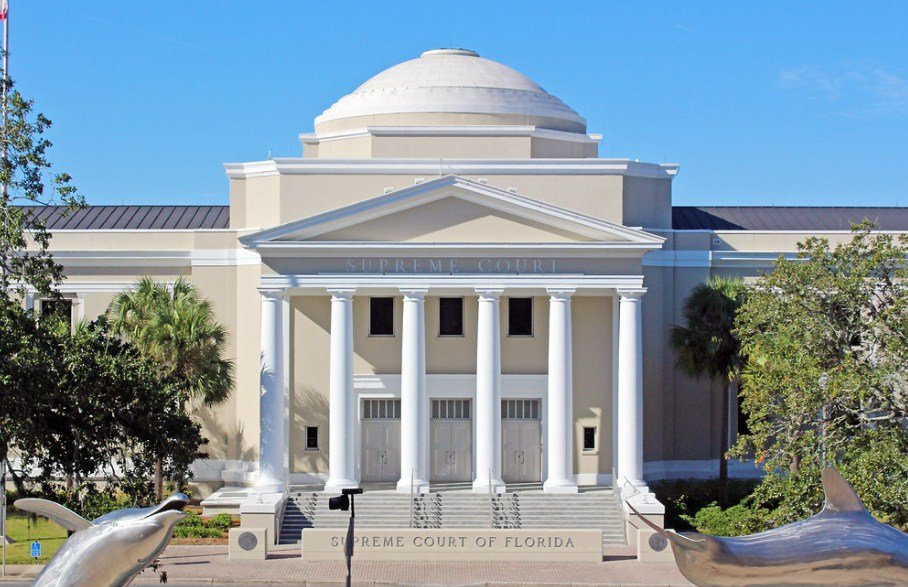The Florida Supreme Court has agreed to take up a challenge to the constitutionality of a congressional redistricting plan that was enacted after the 2020 census and dismantled a Black-majority district in North Florida. The case could have implications for the balance of power in the U.S. House of Representatives, where Republicans currently hold a narrow majority.
Voting rights groups allege racial discrimination
The plaintiffs in the case are voting rights groups and other parties who argue that the redistricting plan violated part of a 2010 constitutional amendment, known as the Fair Districts Amendment, that barred drawing districts that would “diminish” the ability of minorities to “elect representatives of their choice.” They contend that the plan, which was pushed through the Legislature by Republican Gov. Ron DeSantis, racially discriminated against Black voters by scattering them across four North Florida districts won by white Republicans in the 2022 elections.
The district at the center of the dispute is Congressional District 5, which used to connect Black communities from Jacksonville to Tallahassee and was represented by Al Lawson, a Black Democrat. The new map moved the district to the Jacksonville area, where it became more competitive for Republicans. Lawson ran for a redrawn Republican-leaning seat anchored in Tallahassee and lost to GOP Rep. Neal Dunn by 20 points.
The plaintiffs claim that the former version of District 5 contained a cohesive community of Black voters who shared common interests and faced similar challenges, such as poverty, unemployment, and lack of access to health care and education. They also allege that the state failed to consider alternative maps that would have preserved the minority voting strength in the region.

State defends map as fair and legal
The defendants in the case are Secretary of State Cord Byrd and the Legislature, who maintain that the redistricting plan is fair and legal and complies with the state and federal constitutions. They argue that the new map reflects the population changes and demographic shifts that occurred in Florida after the 2020 census, which showed that the state gained nearly 3 million residents and two additional congressional seats.
The state also asserts that the new map does not diminish the ability of Black voters to elect representatives of their choice, as they still have a majority in District 5 and have opportunities to influence the outcomes in other districts. The state points out that the former version of District 5 was an outlier that violated the constitutional requirement of compactness and contiguity and was the result of a previous legal challenge that invalidated the original map drawn by the Legislature in 2012.
The state further contends that the plaintiffs did not present any evidence to support their claim of racial discrimination or to show that the state had a discriminatory intent or effect in drawing the new map. The state also accuses the plaintiffs of relying on outdated data and flawed methodology to measure the voting behavior and preferences of Black voters.
Lower courts issue conflicting rulings
The case has gone through two lower courts that issued conflicting rulings on the constitutionality of the redistricting plan. In September 2023, a Leon County circuit judge agreed with the plaintiffs and found that the plan violated the Fair Districts Amendment by diminishing the ability of Black voters to elect representatives of their choice in North Florida. The judge ordered the state to redraw the map and submit it to the court for approval.
However, in December 2023, the 1st District Court of Appeal overturned the circuit judge’s decision and ruled in favor of the state. The appeals court found that the plaintiffs “failed to present any evidence” that the former version of District 5 contained a singular cohesive community that would have a right to protection under the state constitution. The appeals court also rejected the plaintiffs’ alternative maps as unrealistic and impractical.
The plaintiffs appealed to the Florida Supreme Court, which issued an order on Wednesday saying it will hear the case. The order gave the attorneys for the plaintiffs until Feb. 28 to file an initial brief, followed by 30 days for the lawyers for the state to file an answer brief. The order did not set a date for oral arguments, but said they will be notified of the date approximately 60 days prior to the hearing.
Supreme Court’s decision could affect 2024 elections
The Florida Supreme Court’s decision could affect the outcome of the 2024 congressional elections, as Florida is one of the most populous and politically divided states in the nation. Republicans hold 20 of Florida’s 28 U.S. House seats under the map sponsored by DeSantis in 2022, which gave them an advantage in the redistricting process. Democrats hope to regain some ground by challenging the map in court and mobilizing their voters in the upcoming elections.
The Florida Supreme Court has a more conservative-leaning panel since this issue was last considered, with five of the seven sitting justices appointed by DeSantis. Justice Charles Canady, who is married to Republican state Rep. Jennifer Canady, recused himself from the case. The remaining six justices will hear the case and issue a ruling, which could be appealed to the U.S. Supreme Court.
The case is one of several ongoing legal battles over redistricting across the country, as states redraw their congressional and legislative maps based on the 2020 census data. The redistricting process is often contentious and partisan, as it can determine which party controls the U.S. House of Representatives and the state legislatures for the next decade.

Comments